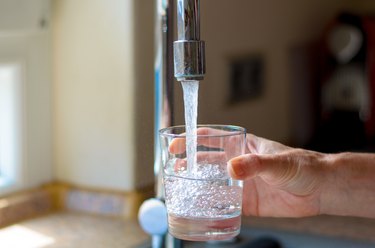
Health experts say that water is a vital nutrient and recommend drinking plenty of it. The nutritional value of water doesn't seem too impressive, though. What you may not know is that its composition depends on the source.
Why Do You Need Water?
Video of the Day
Water makes up 50 to 75 percent of the human body. It's an integral component of your blood, saliva, digestive juices, cells and tissues. It moisturizes your skin, lubricates your joints, carries oxygen to your cells and helps flush out waste, among other functions.
Video of the Day
This vital fluid is also necessary for energy metabolism. It dissolves minerals, water-soluble vitamins and other nutrients so that your body can use them. Furthermore, water regulates your body temperature and ensures proper digestion. It also helps you maintain a healthy weight and keeps you hydrated.
According to a mini-review published in the June 2016 edition of Frontiers in Nutrition, increased hydration may facilitate weight loss and protect against diabetes. Researchers say that water may help prevent obesity due to its thermogenic properties. Additionally, it may stimulate lipolysis, or fat breakdown, and elevate your metabolism.
Read more: 12 Ways to Make Water Taste (Much) Better
On top of that, you don't have to worry about water calories. Just make sure you steer clear of flavored water, vitamin water and other sugary beverages. Plain water has no added sugar, calories, additives or preservatives. It quenches your thirst and fills you up quickly, which in turn, may help prevent overeating.
Water Nutrition Facts
Water contains no protein, carbs or fats, so does it have any nutritional value? The answer is yes. All types of water, including tap water, provide trace elements, such as copper, magnesium and chloride. Springwater and sparkling mineral water are the most nutritious, as they come from underground sources rich in minerals and trace elements.
Here's a quick breakdown of the different types of water, per one-cup serving:
- Tap water — 7 mg of calcium, 2 mg of magnesium, 9 mg of sodium and 0.02 mg of zinc
- Natural sparkling mineral water — 60 mg of calcium and 17 mg of magnesium
- Evian water — 19 mg of calcium and 5 mg of magnesium
- Perrier water — 33 mg of calcium and 2 mg of sodium
- Generic bottled water — 24 mg of calcium, 5 mg of magnesium and 5 mg of sodium
Calcium, one of the trace minerals in water, keeps your bones and teeth healthy, regulates heartbeat and contributes to blood clotting. The daily recommended intake for adults is 1,000 milligrams, according to the U.S. National Library of Medicine.
Natural sparkling mineral water, for example, provides 60 milligrams of calcium per cup. If you drink eight cups a day, that's 480 milligrams of calcium — almost half of the daily recommended intake.
Water is also a good source of magnesium. This mineral regulates energy metabolism, blood sugar levels, heartbeat, muscle contractions and more. The recommended daily allowance is 400 to 420 milligrams for adult men and 310 to 320 milligrams for adult women.
Most types of bottled water have around 5 milligrams of magnesium per cup, so eight cups will provide 40 milligrams of this nutrient. That's approximately 10 percent of the daily recommended magnesium intake for men.
Does Water Promote Weight Loss?
This zero-calorie beverage can make it easier to lose weight. It not only increases satiety but also helps reduce your total food intake and boosts your metabolism.
A cohort study published in the journal Nutrients in October 2016 suggests that replacing one serving of soda or beer per day with water may prevent obesity and facilitate weight loss. Obesity is a major risk factor for diabetes, heart disease and other chronic illnesses, so water consumption may protect against these ailments by helping you achieve a normal weight.
If you're always hungry or feeling the urge to snack, sip on carbonated water. This beverage may improve appetite control and increase satiety, according to a small study featured in the Journal of Nutritional Science and Vitaminology in February 2012. Female subjects who drank carbonated water experienced greater satiety than those drinking plain water.
Remember that water has no calories. Use it as a substitute for energy drinks, coke, cappuccino, frappe, milkshakes and other sugary beverages. This small change can help you save a few hundred calories a day. It takes a 3,500-calorie deficit to lose one pound of fat, meaning that you can get leaner within weeks just by swapping soda for plain water.
- Better Health Channel: "Water – A Vital Nutrient"
- Frontiers in Nutrition: "Increased Hydration Can Be Associated With Weight Loss"
- FDA: "Bottled Water Everywhere: Keeping It Safe"
- USDA: "Tap Water"
- USDA: "Natural Sparkling Mineral Water"
- USDA: "Evian Water"
- USDA: "Perrier Water"
- USDA: "Generic Bottled Water"
- Medline Plus: "Calcium in Diet"
- Medline Plus: "Magnesium in Diet"
- Nutrients: "Substitution Models of Water for Other Beverages, and the Incidence of Obesity and Weight Gain in the SUN Cohort"
- Journal of Nutritional Science and Vitaminology: "The Effects of Carbonated Water Upon Gastric and Cardiac Activities and Fullness in Healthy Young Women"
- Mayo Clinic: "Counting Calories: Get Back to Weight-Loss Basics"